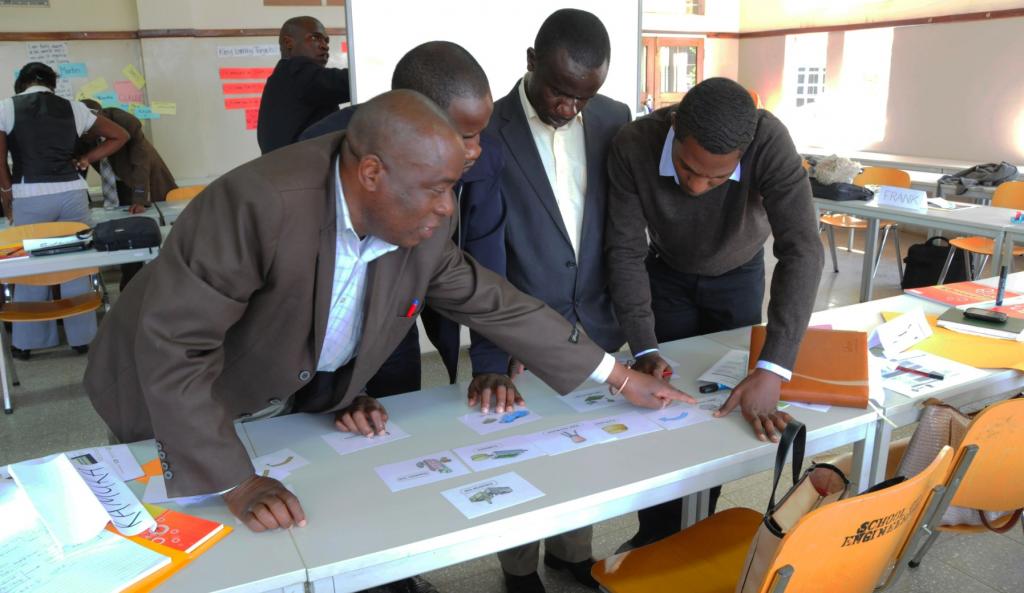
Participants during the SSWM Training of Trainers recently held in at the University of Zambia in Lusaka, Zambia. Source: SEECON (2012)
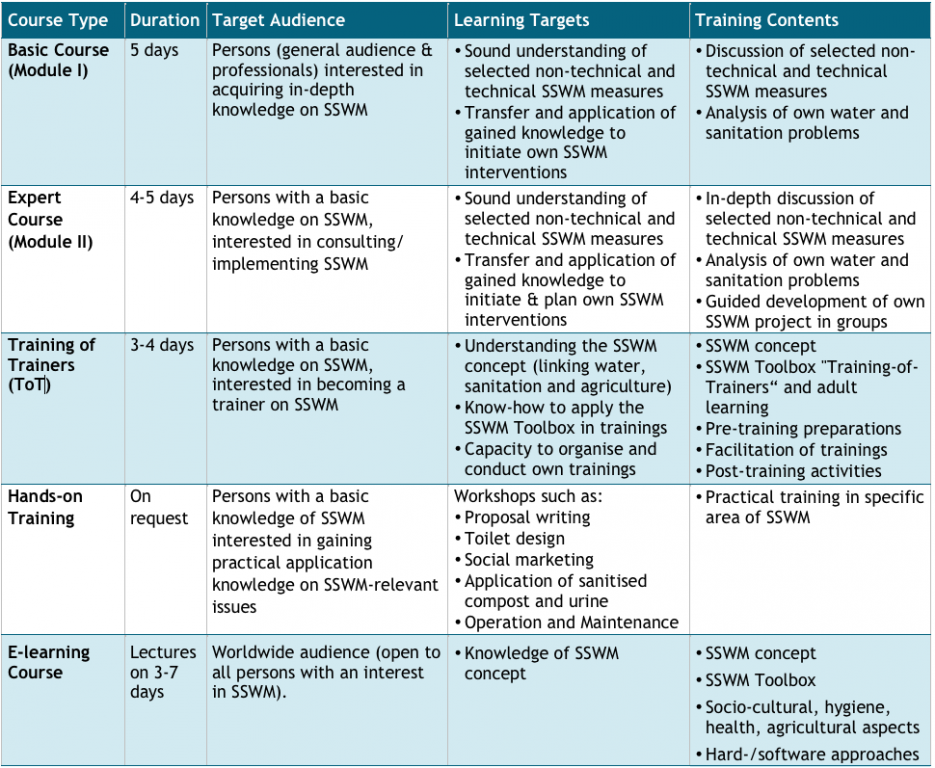
See also a PDF version with full course description.
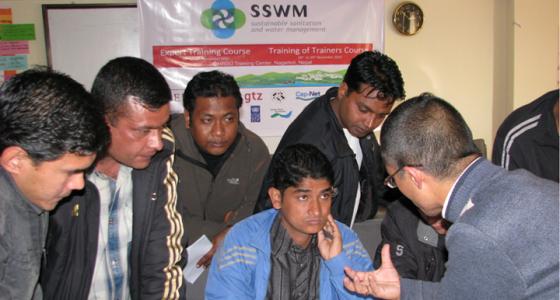
Participant of a SSWM Expert Course in Nagarkot, Nepal. Source: Barreto Dillon (2010)
- 5-day Training of Trainers in Sustainable Sanitation, Water Management and Food Security in collaboration with CapNet, CapNet Brasil, Acquawise, Foodways and seecon in Rio de Janeiro, Brazil, November 24 to 28 2014. Take a look at the invalid link.
2-day Sustainable Sanitation Workshop in collaboration with Global Water Partnerships Central and Eastern Europe in Ljubljana, Slovenia, April 4 to 5 2014. Find the agenda here.
3-day course in rainwater harvesting and sustainable sanitation in collaboration with the International Rainwater Harvesting Alliance (IRHA), RAIN Foundation, Caritas Kaolack and Building Partnerships for Development in Water and Sanitation (BDP) in Kaolack, Senegal, March 10 to 12 2014.
- 5-day SSWM Training of Trainers Workshop in Collaboration with Cap-Net and SaciWATERs-CapNet Network (SCaN) in Hyderabad, India, Dec 2013.
- 5-day SSWM Training of Trainers Workshop in Collaboration with Cap-Net and Red Centroamericana de Instituciones de Ingeniería (REDICA) in Managua, Nicaragua, 30th of September - 4th of October 2013. Take a look at the course announcement and agenda.
- SSWM Introductory Workshop with SARAR methodology and the SSWM-Toolbox in collaboration with SARAR-Transformación, La Paz, Bolivia: 18th and 19th of June, 2013. Find the agenda here.
SSWM Introductory Workshop in collaboration with the Interamerican Development Bank (IDB) to members of the PNSR (National Program of Rural Sanitation in Peru), IDB and Agencia Española de Cooperación Internacional para el Desarrollo (AECID), Lima, Peru: 14th and 15th of June, 2013. Find the agenda here.
- SSWM Introductory Workshop in the frame of the Rural Sanitation Group Work Mission of the Interamerican Development Bank (IDM), Cuzco, Peru: 1st of May, 2013. Find the agenda here.
- SSWM Training of Trainers Workshop in Collaboration with Cap-Net, WaterNet and the Polytechnic of Namibia, Windhoek, Namibia: 26th to 30th of November 2012, Polytechnic of Namibia. Take a look at the course announcement and agenda.
- SSWM Introductory Workshop within the VII Regional Course „Sustainable Ecological Sanitation“, Tepoztlán, Morelos, Mexico: 12th to 23rd November 2012.
- SSWM and Emergency Prepardeness and Response, The Philippines: 13th to 18th of August. Have a look at the agenda and the course announcement.
- SSWM Training of Trainers Sub-Saharan Africa, 2012, Zambia. Find the agenda here.
- SSWM Expert Course and Business Development in SSWM, 2012, Switzerland. Find the agenda here.
- SSWM Africa Workshop, 2012, Zambia
- SSWM Expert Training Module, 2011, Switzerland. Find the agenda here.
- SSWM Expert Training Module, 2010, Nepal. Find the agenda here.
- SSWM Training of Trainers Module, 2010, Nepal. Find the agenda here.
- SSWM Expert Training Module, 2010, India. Find the agenda here.
- SSWM Training of Trainers Module, 2010, India. Find the agenda here.
- SSWM Expert Training Module, 2010, Philippines. Find the agenda here.
- SSWM Training of Trainers Module, 2010, Philippines. Find the agenda here.
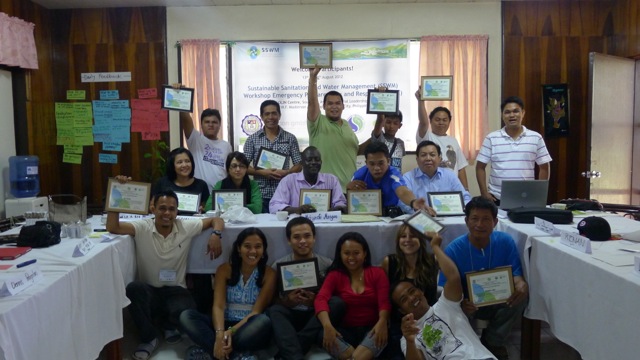
Graduates of the Emergency Preparedness and Response course in The Philippines, conducted in collaboration with Xavier University. Source: SEECON (2012)
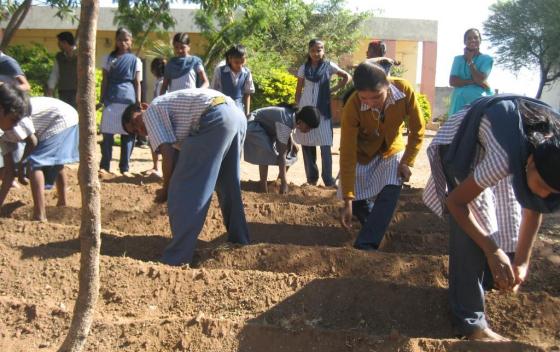
Students (7th - 10th standard) of Shree Baleshwar Anudanit Primary and Secondary Ashram School, Maharashtra State, India, develop vegetable garden for reuse of treated water. Source: ESF (2010)
Click here to download a short brochure on training offers regarding SSWM or contact us.
| For courses oriented towards business development in the sustainable sanitation & water sector, check out cewas, the international centre for water management services (www.cewas.org). |
 | For more information, course registration and further inquiries in SOUTHERN AFRICA, please contact:Cap-Net Email: info@cap-net.org Tel: +27 12 330 9077 Web: http://www.cap-net.org/
|
 | For more information, course registration and further inquiries in MEXICO, please contact:Ron Sawyer SARAR-Transformación Email: sarar@sarar-t.org Tel: +52 (739) 395-7505 Web: http://www.sarar-t.org/ |
 | For more information, course registration and further inquiries in INDIA, please contact:Sreevidya Satish Ecosan Services Foundation (ESF) Email: sreevidya.satish@ecosanservices.org Tel: +91 20 245 300 61 Web: http://www.ecosanservices.org |
 | For more information, course registration and further inquiries in NEPAL, please contact:Bipin Dangol Environment and Public Health Organisation Email: bipindangol@gmail.com Tel: +97 714 686 41 Web: http://www.enpho.org/ |
 | For more information, course registration and further inquiries in THE PHILIPPINES, please contact:Dr. Gina S. Itchon Sustainable Sanitation Center, Xavier University – Ateneo de Cagayan Email: gsijuly18@yahoo.com Tel: +63 91 932 681 68 Web: http://susancenter.xu.edu.ph/ |
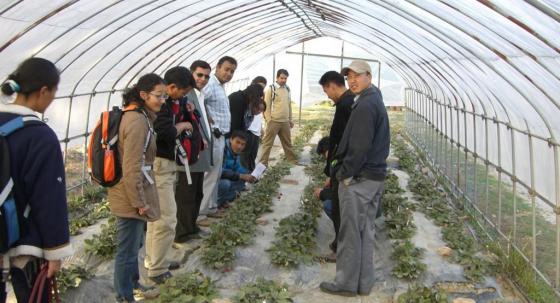
Participants of a SSWM course in Buthan visitng a greenhouse. Source: SEECON (2009)
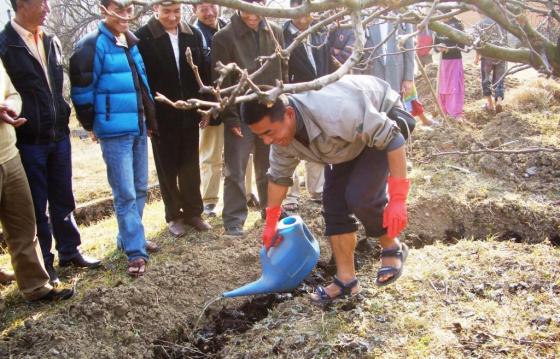
Putting knowledge into practice: hands-on training in sustainable sanitation and agriculture, Nepal. Source: SEECON (2009)


